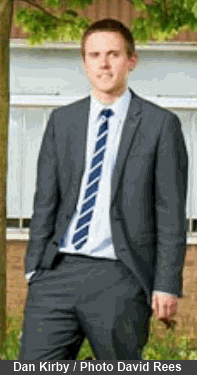|
News & Views item - June 2012 |
![]() Teaching Maths Beats Sitting in Front of a Spreadsheet. (June 25, 2012)
Teaching Maths Beats Sitting in Front of a Spreadsheet. (June 25, 2012)
Wendy Jones writing in The Guardian makes the case for the rewards of
teaching maths when you're both competent and enthusiastic about your subject.
Dan Kirby told Ms Jones that while an undergraduate: "I did a placement with an actuarial firm in Leeds during my degree. It was a great company, but I just didn't find the idea of sitting in front of a spreadsheet from nine to five very exciting." Instead she says "he enrolled on a one-year postgraduate certificate in education (PGCE) course at Oxford" which included many hours in school classrooms and he is now a high school maths teacher who we're told "was recently voted the most passionate teacher by his year-11 students".
Despite data over the last half-dozen years indicating an overall increase in interest in maths in Great Britain, there is a shortage of qualified maths teachers. Professor John Howson, director of DataforEducation.info and a former government adviser on teacher supply, told Ms Jones "there are 1.6 applications to fill every maths vacancy in schools, a fifth of the applicants for arts and humanities subjects. Quite simply, the pool of postgraduate mathematicians is shrinking", and Joan McVittie, head of Woodside High School in north London, one of the Department of Education's top "improved" schools, said they are losing four outstanding maths teachers, three of them going overseas.
And she went on to say that it is difficult finding satisfactory replacements; some applicants lack a decent maths qualification and some don't have the communication skills: "I've interviewed a number of candidates whom I just wouldn't put in front of the children."
Anne Watson, professor of mathematics education at Oxford University makes the point: "You've got to understand the subject and have a breadth of knowledge to be able to teach it well. We're looking for people with a creative approach to maths, who're not just test-driven," and adds that fewer than 20% of young people continue with maths beyond 16, lower than in many other countries.
Ms Jones then gives Dan Kirby the last word: "It's a difficult job but if you have a bad day, you come back and try something different the next day. It's all about understanding the way the kids think."
And in Australia, physics Nobel Laureate Brian Schmidt recently voiced his concern that one-third of the nation's maths teachers were under or unqualified.